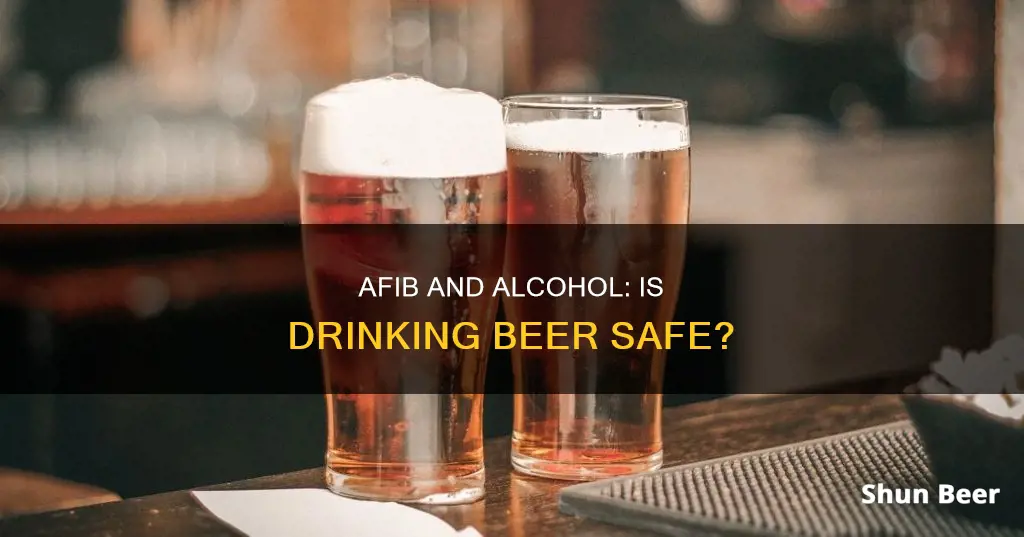
Drinking alcohol can increase the risk of developing atrial fibrillation (AFib), a condition that causes the heart to beat rapidly and irregularly, leading to potential blood clots, strokes, and heart failure. While past studies suggested moderate drinking may have heart benefits, recent evidence indicates that even small amounts of alcohol can negatively impact heart health. For those already diagnosed with AFib, alcohol can trigger symptoms such as heart palpitations, with binge drinking being particularly harmful. While there are no strict guidelines, health experts recommend that individuals with AFib avoid alcohol, as even a single drink can be too much for some, triggering AFib symptoms.
| Characteristics | Values |
|---|---|
| Alcohol consumption and AFib | Even a moderate amount of alcohol can increase the risk of AFib |
| Holiday heart syndrome | Phenomenon of worsened AFib episodes associated with alcohol consumption at popular holidays |
| Recommended alcohol consumption for AFib patients | No more than one standard alcoholic beverage a day for women and two for men |
| Alcohol's impact on the heart | Alcohol can trigger symptoms of AFib such as heart palpitations |
| AFib and alcohol research | Research shows that reducing or stopping alcohol consumption can improve AFib symptoms |
What You'll Learn

Even a moderate amount of alcohol can increase the risk of AFib
Cardiology experts have long thought that there was a connection between alcohol consumption and an increased risk of AFib. A study released in 2021 confirmed that fact. The study found that having a single glass of wine, beer, or another alcoholic beverage doubled a person's risk of having AFib within the next four hours. Having more than one glass tripled the risk.
The research study also found that for every 0.1% increase in a person's blood alcohol level, their risk of having an AFib episode increased by 40%. This means that the more alcohol consumed, the higher the risk of having an AFib episode.
While moderate drinking may be okay for some people with AFib, it is important to note that alcohol can trigger symptoms of the condition, such as heart palpitations. It is also important to consider other risk factors for AFib, such as age, diabetes, and high blood pressure. If you have risk factors for AFib, moderate drinking may increase your risk. Talk to your doctor about your individual risk factors and whether it is safe for you to drink alcohol.
In addition, alcohol can interact with medications taken to manage AFib. For example, vitamin K antagonists like warfarin or acenocoumarol can increase the risk of bleeding when combined with alcohol. Alcohol use can also cause warfarin to build up in the body, leading to potential complications.
Overall, while the occasional single alcoholic beverage is probably okay, it is important to remember that the risk of AFib increases significantly with every drink consumed in a single sitting. If you are at a higher risk of AFib, it is advisable to consider non-alcoholic drinks instead. Maintaining a healthy lifestyle with a balanced diet, regular physical activity, and stress management techniques like meditation can also help protect your heart.
Do LCBO Gift Cards Work at Beer Store?
You may want to see also

Alcohol can trigger symptoms of AFib
The exact mechanisms by which alcohol affects the heart are not fully understood, but several theories have been proposed. One theory suggests that alcohol stimulates the vagal nerve in the neck, leading to increased nerve activity that can trigger an AFib event. Alcohol can also cause dehydration, which can further trigger AFib episodes. In addition, alcohol interacts negatively with medications used to manage AFib, such as vitamin K antagonists like warfarin, which increase the risk of bleeding when combined with alcohol.
The impact of alcohol on AFib risk appears to be dose-dependent, with every additional standard alcoholic drink per day increasing the risk of AFib by 8%. Abstinence from alcohol among regular drinkers may reduce the risk of AFib recurrence. However, it is important to note that the decision to drink or abstain should be made in consultation with a doctor, as the effects of alcohol on AFib can vary from person to person.
While moderate alcohol consumption is generally considered to be one drink per day for women and two drinks per day for men, binge drinking is defined as consuming five or more drinks in a single day and is strongly discouraged for people with AFib. To reduce the risk of AFib symptoms and improve heart health, it is recommended to incorporate non-drinking days, stay hydrated, and maintain a healthy lifestyle with proper nutrition, exercise, and stress management.
The Intricacies of a Beer Exchange: Trading and Sampling
You may want to see also

Binge drinking is harmful to the heart
Binge drinking is a major public health problem worldwide. It is defined as consuming four or more drinks for women and five or more drinks for men in about two hours. Binge drinking is associated with a higher risk of cardiovascular disease, including heart attacks, arrhythmias, and stroke.
The negative effects of binge drinking on the heart include:
- Transient increases in blood pressure, which can lead to pre-hypertension and hypertension.
- Increased risk of myocardial infarction (heart attack) and mortality after a heart attack.
- Heightened risk of cardiac arrhythmias, such as atrial fibrillation.
- Increased risk of stroke and stroke mortality.
- Oxidative stress and vascular injury, which can lead to atherosclerosis.
- Altered vasoreactivity of smooth muscle cells, which can affect blood vessel function.
- Increased risk of thrombus formation due to changes in hemostatic/coagulation mechanisms.
- Prolonged QTc interval on the electrocardiogram, which may lead to ventricular arrhythmias.
The mechanisms underlying the negative effects of binge drinking on the heart are not fully understood, but it is believed that alcohol may trigger symptoms such as heart palpitations and erratic heartbeats. Binge drinking can also lead to dehydration, which can stress the organs and deplete mineral levels, further triggering atrial fibrillation. Additionally, alcohol can interfere with medications taken to manage atrial fibrillation, such as blood thinners, increasing the risk of bleeding.
To maintain heart health, it is recommended to avoid binge drinking and stick to moderate drinking levels, which are defined as no more than one drink per day for women and no more than two drinks per day for men. It is also important to be honest with your doctor about your drinking habits so they can provide personalized advice and guidelines.
Beer Traps: Effective Earwig Control or Urban Myth?
You may want to see also

AFib patients can drink alcohol in moderation
It is well-known that alcohol is the most commonly consumed drug worldwide. However, for people with atrial fibrillation (AFib), the most common type of heart rhythm disorder, drinking alcohol can be risky. AFib patients often wonder if they can safely consume alcoholic beverages without triggering their symptoms. While the relationship between alcohol and AFib is complex, AFib patients can drink alcohol in moderation by following certain guidelines.
The Link Between Alcohol and AFib
Cardiologists have long suspected a connection between alcohol consumption and an increased risk of AFib. Research has confirmed this link, showing that even moderate alcohol intake can trigger AFib symptoms. Alcohol can affect the vagal nerve, leading to a spike in nerve activity that may spark an AFib event. Additionally, alcohol can dehydrate the body, stress organs, deplete mineral levels, and trigger AFib. It is important to note that the impact of alcohol on AFib varies from person to person and may depend on factors such as medical history and medication regimen.
Guidelines for AFib Patients
While AFib patients are advised to avoid drinking altogether, some may be able to consume alcohol occasionally without adverse effects. It is crucial to consult with a doctor to understand individual risks and symptoms. The general recommendation for daily alcohol consumption is moderation: no more than one standard drink for women and two for men. AFib patients should also incorporate non-drinking days into their routine to reduce overall consumption and give their bodies time to recover. Staying hydrated is essential, so drinking a glass of water with each alcoholic beverage is recommended.
Alcohol's Impact on AFib Progression
Continuing to consume alcohol while living with AFib can have consequences. Research shows that alcohol increases the progression from paroxysmal to persistent AFib and leads to more AFib recurrences following AFib ablation procedures. Additionally, AFib patients who stopped drinking alcohol experienced a 20% improvement in their symptoms compared to those who continued drinking. While there is no cure for AFib, reducing alcohol consumption can positively impact overall health and AFib symptoms.
In conclusion, while AFib patients should exercise caution and moderation when consuming alcohol, it is possible to enjoy an occasional drink without compromising their health. Staying informed, consulting medical professionals, and making healthy choices are key to managing AFib effectively.
Dry January: Beer or No Beer?
You may want to see also

Doctors recommend taking days off from drinking alcohol
Taking a break from alcohol can provide several health benefits. Firstly, it can help to repair liver damage caused by excessive drinking. The liver is a tolerant organ, and positive changes can occur within weeks of abstaining from alcohol. Secondly, reducing alcohol intake can lower your risk of heart disease. Excessive alcohol consumption can increase the risk of cardiovascular disease and stroke. By cutting back on alcohol, you can help protect your heart health.
Additionally, taking days off from drinking alcohol can help to reduce your risk of developing certain types of cancer. Alcohol has been linked to an increased risk of head, neck, esophagus, liver, breast, colon, and rectum cancers. By abstaining from alcohol, you may also experience improved sleep quality, better mental clarity, and weight loss.
It is important to note that the effects of taking a break from alcohol can vary from person to person. While some people may experience significant health improvements, others may not notice any drastic changes. However, taking a break from alcohol can also have benefits beyond physical health. It can help you evaluate your relationship with alcohol and understand its impact on your life. It can also provide financial savings and improve your overall quality of life by reducing the negative effects of hangovers.
If you are considering taking a break from alcohol, it is recommended to have a plan in place and seek medical advice if you have concerns about withdrawal symptoms.
Topsy Keurig Beer: Brewing Innovation Explained
You may want to see also
Frequently asked questions
For some people with AFib, drinking alcohol in any amount may be too much, but moderate drinking may be okay for others. If you already have AFib, you should avoid alcohol if it triggers your symptoms.
Atrial fibrillation (AFib) is a condition that makes your heart beat really fast and out of rhythm. AFib can lead to blood clots, strokes, heart failure, and other heart conditions.
Doctors believe that alcohol disrupts your heart’s natural pacemaker — the electrical signals that are supposed to keep it beating at the right pace.
Moderate drinking means no more than one drink per day for women and no more than two drinks per day for men.
Holiday Heart Syndrome refers to heart issues that occur when a person is overindulging in unhealthy foods and alcohol during the holiday season.







